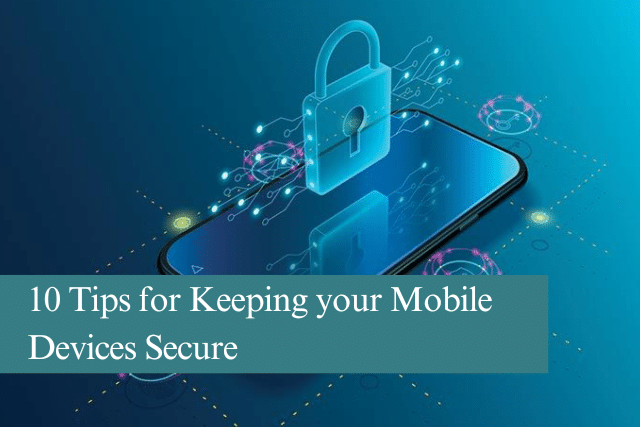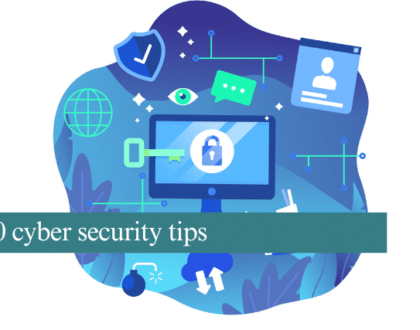
Mobile devices are an essential part of our daily lives. We use them for communication, banking, shopping, and even managing our businesses. As our dependence on smartphones and tablets grows, so does the risk of cyber threats. Mobile devices store vast amounts of personal information, making their security more critical than ever.
To help protect your device, here are essential tips for enhancing its security.
Enable a Strong Password or Biometric Authentication
One of the simplest yet most effective ways to secure your mobile device is by using a strong password, PIN, or biometric authentication like fingerprints or facial recognition. Avoid easily guessable combinations such as “1234” or birthdays. A combination of letters, numbers, and special characters adds an extra layer of complexity. Biometric options are also highly secure, ensuring only you can unlock your phone.
Use Two-Factor Authentication (2FA)
Two-factor authentication (2FA) adds an additional layer of security to your accounts by requiring two forms of identification. Even if someone manages to steal your password, they won’t be able to access your accounts without the second form of verification, usually a code sent to your mobile device. Enable 2FA on all your sensitive accounts, including email, social media, and banking apps.
Update Your Operating System and Apps Regularly
Outdated software can leave your device vulnerable to attacks, as hackers often exploit known security flaws. Keep your operating system and apps up-to-date to ensure you’re protected with the latest security patches. Many mobile devices have automatic update options turn this feature on to ensure your system is always current.
Be Cautious When Using Public Wi-Fi
Public Wi-Fi networks are convenient, but they are also a playground for hackers. Avoid accessing sensitive information, such as banking accounts or personal data, when connected to unsecured networks. If you must use public Wi-Fi, consider using a virtual private network (VPN) to encrypt your internet traffic and protect your privacy.
Install Trusted Security Apps
Install a reputable security app to help protect your device from malware, phishing attacks, and viruses. Look for apps that offer real-time scanning, theft protection, and safe browsing features. Make sure to download apps from official app stores like Google Play or the Apple App Store to avoid malware-laden third-party downloads.
Review App Permissions
Many apps request access to personal information or functions of your mobile device, such as your camera, contacts, or location. Be wary of granting unnecessary permissions. Review each app’s permissions regularly, and deny access if you feel the app doesn’t need it. This reduces the risk of your personal information being compromised.
Avoid Downloading Apps from Unknown Sources
While it might be tempting to download apps from third-party sources, it’s best to stick with official app stores. Third-party apps may not be properly vetted and could contain malware or spyware designed to steal your personal data. Both Apple and Google have stringent checks in place for apps in their stores, making them the safest places to download from.
Encrypt Your Data
Encryption is a powerful way to keep your data secure. It converts your data into unreadable code that can only be deciphered with the right decryption key. Most modern devices offer encryption by default, but you can ensure it’s enabled in your device’s security settings. For extra protection, consider using encrypted messaging apps, like Signal or WhatsApp, for secure communication.
Beware of Phishing Scams
Phishing attacks aren’t just limited to emails they also happen through text messages and apps. Be skeptical of unsolicited messages asking for personal information, passwords, or account details. If you receive a suspicious message, avoid clicking any links or downloading attachments. If in doubt, contact the service provider directly to verify the legitimacy of the message.
Use Remote Wipe Features
In case your phone is lost or stolen, being able to remotely wipe its data can be a lifesaver. Most devices have built-in features that allow you to locate, lock, or erase your phone from a distance. Apple’s “Find My iPhone” and Google’s “Find My Device” are excellent tools for this. Ensure that this feature is activated, so you can take action quickly if needed.
Backup Your Data Regularly
Backing up your data might not directly prevent your phone from being hacked, but it’s crucial for recovering your information in case of theft, loss, or a cyberattack. Use cloud services like Google Drive, iCloud, or other secure backup solutions to ensure your files, photos, and other data are safely stored and can be retrieved at any time.
Recommended Posts

IT Simplified: What Is A Firewall?
21st March 2025

10 cyber security tips
14th March 2025

